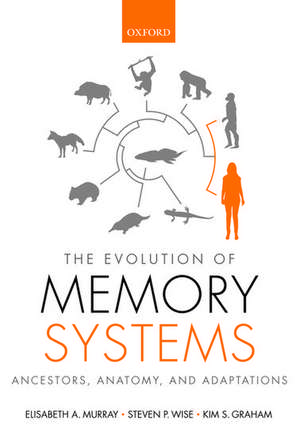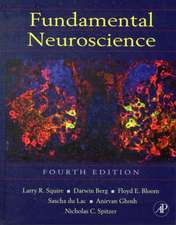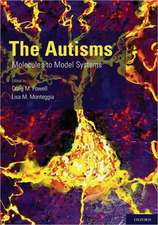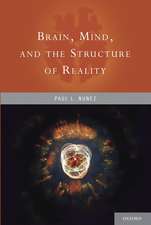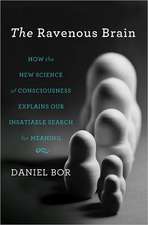The Evolution of Memory Systems: Ancestors, Anatomy, and Adaptations: Oxford Psychology Series
Autor Elisabeth A. Murray, Steven P. Wise, Kim S. Grahamen Limba Engleză Paperback – 5 oct 2017
| Toate formatele și edițiile | Preț | Express |
|---|---|---|
| Paperback (1) | 286.36 lei 31-38 zile | |
| OUP OXFORD – 5 oct 2017 | 286.36 lei 31-38 zile | |
| Hardback (1) | 604.28 lei 31-38 zile | |
| OUP OXFORD – 3 noi 2016 | 604.28 lei 31-38 zile |
Din seria Oxford Psychology Series
- 30%
 Preț: 787.68 lei
Preț: 787.68 lei - 11%
 Preț: 314.60 lei
Preț: 314.60 lei - 23%
 Preț: 330.78 lei
Preț: 330.78 lei - 34%
 Preț: 1595.08 lei
Preț: 1595.08 lei - 30%
 Preț: 590.97 lei
Preț: 590.97 lei -
 Preț: 356.82 lei
Preț: 356.82 lei - 30%
 Preț: 1859.05 lei
Preț: 1859.05 lei - 22%
 Preț: 328.28 lei
Preț: 328.28 lei - 22%
 Preț: 485.66 lei
Preț: 485.66 lei - 47%
 Preț: 354.55 lei
Preț: 354.55 lei - 34%
 Preț: 643.07 lei
Preț: 643.07 lei - 31%
 Preț: 448.18 lei
Preț: 448.18 lei - 46%
 Preț: 464.82 lei
Preț: 464.82 lei - 30%
 Preț: 675.99 lei
Preț: 675.99 lei - 33%
 Preț: 497.94 lei
Preț: 497.94 lei -
 Preț: 341.30 lei
Preț: 341.30 lei - 50%
 Preț: 760.43 lei
Preț: 760.43 lei - 22%
 Preț: 354.88 lei
Preț: 354.88 lei - 19%
 Preț: 453.58 lei
Preț: 453.58 lei - 34%
 Preț: 802.03 lei
Preț: 802.03 lei - 27%
 Preț: 351.88 lei
Preț: 351.88 lei - 8%
 Preț: 340.84 lei
Preț: 340.84 lei - 39%
 Preț: 1218.33 lei
Preț: 1218.33 lei - 34%
 Preț: 1167.22 lei
Preț: 1167.22 lei - 34%
 Preț: 609.78 lei
Preț: 609.78 lei - 8%
 Preț: 310.81 lei
Preț: 310.81 lei - 28%
 Preț: 431.42 lei
Preț: 431.42 lei - 34%
 Preț: 1168.02 lei
Preț: 1168.02 lei - 34%
 Preț: 818.86 lei
Preț: 818.86 lei - 50%
 Preț: 520.77 lei
Preț: 520.77 lei -
 Preț: 127.27 lei
Preț: 127.27 lei -
 Preț: 282.75 lei
Preț: 282.75 lei - 24%
 Preț: 386.49 lei
Preț: 386.49 lei - 34%
 Preț: 1434.66 lei
Preț: 1434.66 lei - 27%
 Preț: 502.06 lei
Preț: 502.06 lei - 28%
 Preț: 605.94 lei
Preț: 605.94 lei - 23%
 Preț: 523.62 lei
Preț: 523.62 lei - 34%
 Preț: 762.60 lei
Preț: 762.60 lei - 28%
 Preț: 488.97 lei
Preț: 488.97 lei - 22%
 Preț: 422.01 lei
Preț: 422.01 lei - 31%
 Preț: 397.59 lei
Preț: 397.59 lei - 34%
 Preț: 599.38 lei
Preț: 599.38 lei - 16%
 Preț: 341.24 lei
Preț: 341.24 lei
Preț: 286.36 lei
Preț vechi: 321.16 lei
-11% Nou
Puncte Express: 430
Preț estimativ în valută:
54.79€ • 57.21$ • 45.35£
54.79€ • 57.21$ • 45.35£
Carte tipărită la comandă
Livrare economică 24-31 martie
Preluare comenzi: 021 569.72.76
Specificații
ISBN-13: 9780198817130
ISBN-10: 0198817134
Pagini: 528
Dimensiuni: 179 x 247 x 25 mm
Greutate: 1.02 kg
Editura: OUP OXFORD
Colecția OUP Oxford
Seria Oxford Psychology Series
Locul publicării:Oxford, United Kingdom
ISBN-10: 0198817134
Pagini: 528
Dimensiuni: 179 x 247 x 25 mm
Greutate: 1.02 kg
Editura: OUP OXFORD
Colecția OUP Oxford
Seria Oxford Psychology Series
Locul publicării:Oxford, United Kingdom
Recenzii
Capitalizing on major advances in our understanding of both memory and brain evolution, this book provides the first - and long overdue - account of memory systems placed in an evolutionary context. The result is a captivating and comprehensive survey of two histories, the history of the brain and the history of ideas about memory, which culminates in a new and provocative proposal for the origin of memory. Anyone interested in the brain and behaviour, evolution, or the history of science will find The Evolution of Memory Systems a stimulating read.
The authors convincingly demonstrate that memory systems, and perhaps all neural systems, are best understood in terms of when and why they evolved to meet challenges of the past. Thus, this is a book for those interested in how brains work, and how they differ. This impressive book is like no other in its scope on the successive evolution of memory systems from early vertebrates to present-day humans. I want all my students and co-workers to read it.
A critical component of defining who we are requires an understanding of our individual past experiences and how they are represented in the brain, as well as how our brain, and in particular memory circuits, evolved in mammals. This book is a tour-de-force on the evolution of memory systems in mammals. It provides a wonderful historical perspective, and an extensive comparative analysis. While the major thrust is to understand human capabilities, particularly circuitry involved in memory, the authors painstakingly review the literature and clearly articulate that these systems did not evolve de novo in humans, but that a basic plan was present in our earliest ancestors. This type of discussion is rarely found in a neuroscience community entrenched in studies of single animal models. Kudos to the authors for writing the most comprehensive and interesting text currently available on this topic.
Through their combined evolutionary and neuroscience approach the authors beautifully reveal the building blocks of memory systems that combine to produce the complexities of cognition in the human brain.
This is an important book for several reasons. First, there is the unique way that the authors formulate their proposals within an evolutionary context, explaining what makes memory special in mammals, in primates, and in humans. Second, their survey of the cognitive neuroscience of memory is guided by an exciting and provocative new taxonomy of memory systems that takes the reader far beyond the hippocampus and medial temporal lobe.
The authors convincingly demonstrate that memory systems, and perhaps all neural systems, are best understood in terms of when and why they evolved to meet challenges of the past. Thus, this is a book for those interested in how brains work, and how they differ. This impressive book is like no other in its scope on the successive evolution of memory systems from early vertebrates to present-day humans. I want all my students and co-workers to read it.
A critical component of defining who we are requires an understanding of our individual past experiences and how they are represented in the brain, as well as how our brain, and in particular memory circuits, evolved in mammals. This book is a tour-de-force on the evolution of memory systems in mammals. It provides a wonderful historical perspective, and an extensive comparative analysis. While the major thrust is to understand human capabilities, particularly circuitry involved in memory, the authors painstakingly review the literature and clearly articulate that these systems did not evolve de novo in humans, but that a basic plan was present in our earliest ancestors. This type of discussion is rarely found in a neuroscience community entrenched in studies of single animal models. Kudos to the authors for writing the most comprehensive and interesting text currently available on this topic.
Through their combined evolutionary and neuroscience approach the authors beautifully reveal the building blocks of memory systems that combine to produce the complexities of cognition in the human brain.
This is an important book for several reasons. First, there is the unique way that the authors formulate their proposals within an evolutionary context, explaining what makes memory special in mammals, in primates, and in humans. Second, their survey of the cognitive neuroscience of memory is guided by an exciting and provocative new taxonomy of memory systems that takes the reader far beyond the hippocampus and medial temporal lobe.
Notă biografică
Elisabeth A. (Betsy) Murray was raised with her three brothers in Syracuse, New York. She received a B.S. in Biology from Bucknell University in Lewisburg, Pennsylvania and a Ph.D. in Physiology from the University of Texas Medical Branch at Galveston, Texas. Dr. Murray is an elected Fellow of the Association for Psychological Science, of the American Psychological Association, and of the American Association for the Advancement of Science. She currently heads the Laboratory of Neuropsychology at the National Institute of Mental Health in Bethesda, Maryland.Steven P. Wise received a B.A. in Biology from Dartmouth College and a Ph.D. from Washington University (St. Louis) in Biology. After a brief period of postdoctoral study, he had a 30-year career in neurophysiology at the National Institute of Mental Health in Bethesda and Poolesville, Maryland. Dr Wise served as Chief of the Laboratory of Neurophysiology and Chief of the Section on Neurophysiology of the Laboratory of Systems Neuroscience.Kim S. Graham received a B.Sc. In Biological Sciences from Edinburgh University, followed by a Ph.D. from Cambridge University in Psychology. She subsequently worked as a research scientist at the MRC Cognition and Brain Sciences for 12 years, prior to moving to Cardiff University in 2007, where she is currently a Professor of Cognitive Neuroscience.
